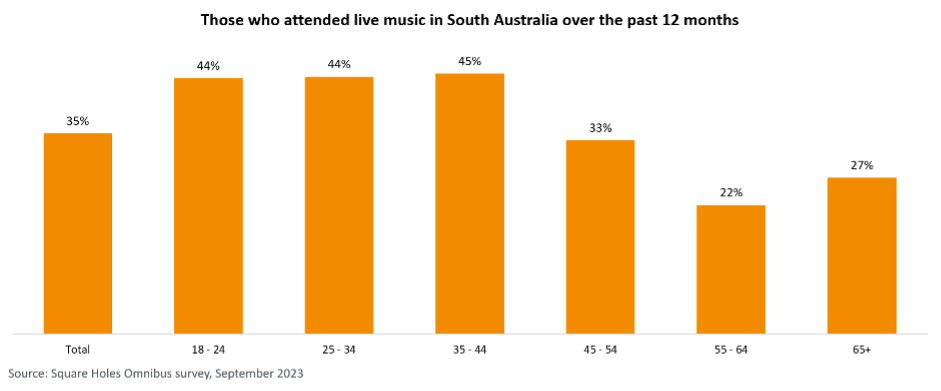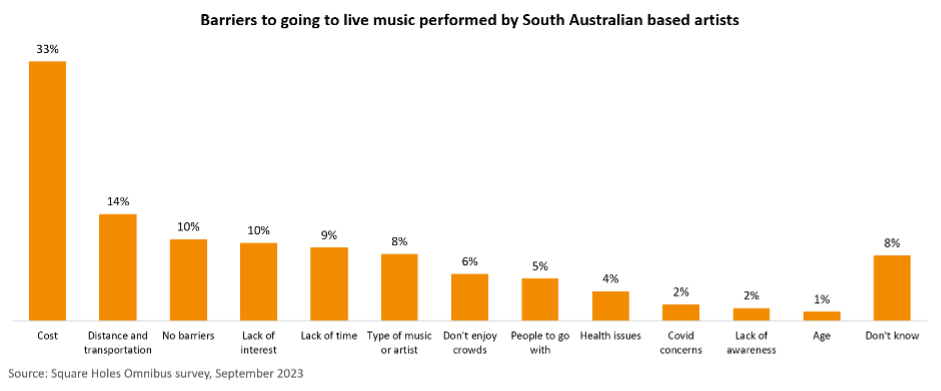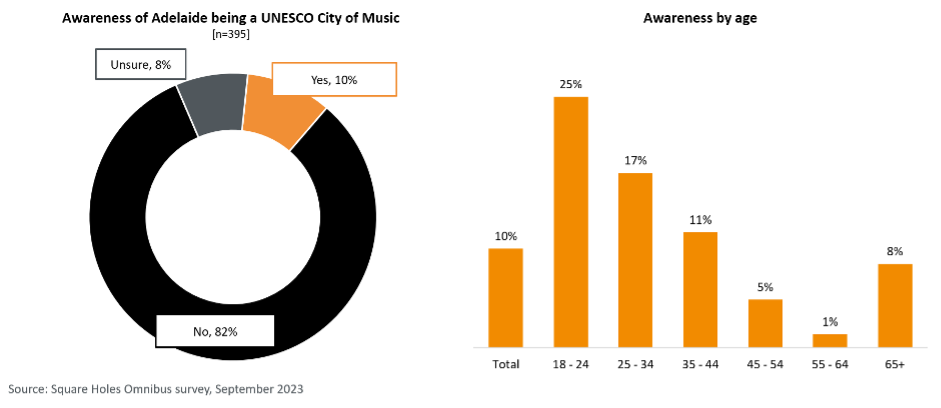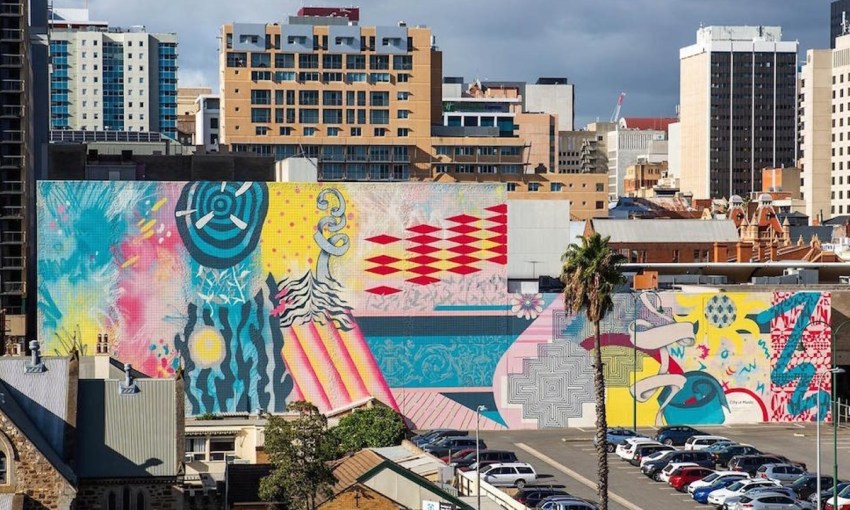Square Holes, a local market research and cultural insights agency, asked South Australians about their live music habits and awareness of Adelaide's UNESCO City of Music status. Mahalia Tanner explores the results.
Is Adelaide really a ‘city of music’?
In 2015 Adelaide’s bid to become a UNESCO City of Music was green lit, making the South Australian capital the first and only in the country with that title.
The moniker means that Adelaide is a part of a network of international creative cities, spanning literature, film, design, and music – and joins the ranks of international music hotspots like Glasgow, Havana, Liverpool and Belfast.
But with a spate of venue closures in the West End of the city in recent months, rising cost of living concerns and easy access to free music from streaming platforms like Spotify, making it in the music industry is harder than ever for South Australian creatives.
In a survey conducted in September 2023 of the South Australian public by market research and cultural insight agency Square Holes, only 35 per cent of respondents had attended a live music event in the past 12 months. And of that number, only 42 per cent of those events featured South Australian based musicians or bands.

For musicians like Naomi Keyte, an Adelaide-based singer-songwriter who has been gigging for over 15 years, the effect of COVID-19 restrictions and cost of living pressures has seen a downturn in attendance to her shows.
“Things took a real downturn last year,” says Keyte.
“I noticed that halfway through the year I just wasn’t selling tickets to shows in the same way that I usually would. A handful of gigs were particularly tricky; I either just broke even or, in some cases, lost money.
“I try to pay my band properly. I try to pay my support artists properly. I try to pay the people I work with properly, but oftentimes I can’t pay myself properly. And that just feels exhausting.”
She puts it down to changes in habits by punters post restrictions, tightening of wallets, and a focus on international and big-name touring acts.
“Maybe people got used to spending more time at home, or perhaps it’s a cost-of-living issue. I think another element to this is that people are excited to see touring artists coming to Adelaide/Kaurna Yerta,” says Keyte.
“There was a period between 2020 -2021 where we could only see local live music because international touring wasn’t possible, and now that touring and commercial festivals are happening again, people are investing in those events.
“But, also, a fundamental issue is that I don’t think we place enough value on local live music. We don’t centre it as a part of our identity as a state, in the same way that we centre food, wine, the festival season, and sport. More broadly, there doesn’t seem to be enough importance placed on music education. If we don’t understand something or learn how to engage with it, how can we fully appreciate, value, and protect it?”
In the study conducted by Square Holes, respondents overwhelmingly pointed to cost as the major barrier in going to see local live music acts, with 33 per cent of the sample placing it as their main hurdle, followed by distance and transport (14 per cent).

Venue owner Sharni Honor says that dwindling ticket sales and the cost of touring are putting a real strain on venues that were already doing it tough after COVID restrictions.
Honor has been running events in the state for over 11 years through her small business The Porch Sessions, now reborn as Porch Records, and is coming into her fifth year as co-director of Summertown Studios, a live music venue, shopfront and co-working space hybrid in Somerton Park.
“I think there’s no doubt that it’s a pretty unbelievable time to be running a venue,” she says.
“I think in general, running a small business right now is fiercely challenging, let alone operating in the live music sphere simultaneously. I know a lot of people are really feeling that pressure.”
Honor says the decline in ticket sales indicates that people are really feeling the strain of rising prices and that seeing live music isn’t a priority for South Australians currently.
“Entertainment and hospitality are usually the first two things to go when people are feeling the pinch,” she says.
“I think people are just spending less money in that zone, spending less money on themselves because of the pressures of living.”
Joe Hay, General Manager, Adelaide UNESCO City of Music calls the current climate a “perfect storm” for the music industry.
“You’ve got cost of living, you’ve got coming out of Covid, you’ve got changes in how people socialise and how they engage with music through the introduction of social media and streaming sites,” he says.
“But on the other side, you’ve got 1,000,001 bands that are coming through the system and they’re so good. Oh my God, I haven’t been this excited in years. It’s fantastic.”
Hay believes that the role of his office and the strength of the UNESCO title is to partner with industry to rebuild the culture of locals going to see local live music, while also building on network opportunities with other UNESCO cities around the world.
“You have to connect; you have to get back into the networks and you have to rebuild those social connections. You rebuild the process,” he says.
Hay, who says he has made a career out of “being a bridge between the outrageous creative and bureaucracy”, believes that the best way to mobilise South Australian audiences is by pushing the envelope.
“Mediocrity does not drive a needle – I think fundamentally it’s about exciting people, inspiring people, and tapping into that creative energy and wonder and fear that’s out there,” he says.
In the study conducted by Square Holes, 82 per cent of respondents were not aware of Adelaide’s UNESCO status, indicating that there is still some work to be done on getting the South Australian public involved and invested in the title.

As an artist, Naomi Keyte believes that we could be better at owning the label.
“I feel like there could be a lot more discourse around the fact that we are a UNESCO City of Music and more pride taken in it. It would be exciting to see more meaningful, tangible activities and opportunities linked to it,” she says.
“It would be great to see more connections being made between sibling UNESCO cities, such as residency opportunities and touring exchanges. I don’t think we have fully embodied our title of ‘City of Music’ yet, and I would love to see that.”
Honor says that while she agrees with the premise of the title and its role in promoting Adelaide as a music hub, she feels there is still ambiguity around what it means for the music industry here.
“There’s definitely a degree of mystery around UNESCO. I think there are a number of people from inside the industry who feel indifferent to just how much impact it serves our music scene here in Adelaide,” she says.
“However, I do think overall it does promote a positive global conversation about this city being really firmly associated with live music, which I love.”
As a business owner operating a venue in the suburbs, Honor also feels that venues operating outside the CBD are regularly overlooked.
“I do find it to be really CBD centric. I think it really champions and highlights city centric venues, artists and projects, but the diverse and unique nature of our scene means that it exists so far beyond the four walls of our city,” she says.
“I think our suburban venues, our regional venues, our festivals, our experiences beyond the city are really what makes this ecosystem so brilliant. And I think UNESCO maybe doesn’t speak to that.”
For Hay, the designation is only as strong as the community ownership of it. The office has been working hard to engage and get the whole music industry and music community behind our UNESCO classification and embrace our status as a cultural epicentre of music in the country.
“Our whole aim is to get everyone to run with it, to promote the designation, to own and promote it in their own way,” he says.
“There’s often a reluctance to claim anything cultural or intellectual or emotional. But the reality is Adelaide continually produces internationally regarded artists and music professionals across the music spectrum. Sound people and technologists and audio companies and instrument makers, hip hop, folk, punk, metal, EDM, opera and classical and jazz, the whole gamut.”
Known for her creativity in how she builds space and opportunities for artists to share their music, Honor agrees that something the designation does is highlight the strength of our music offering.
“I think it (the Adelaide music scene) doesn’t look like a cookie-cutter version of what live music culture maybe looks like in a larger city or I guess a city that’s more associated with music. But I think the diversity of our music experience, the community behind the music, I think is incredibly strong and really unique,” she says.
“The offering here musically is one of the most unique in the country.”




